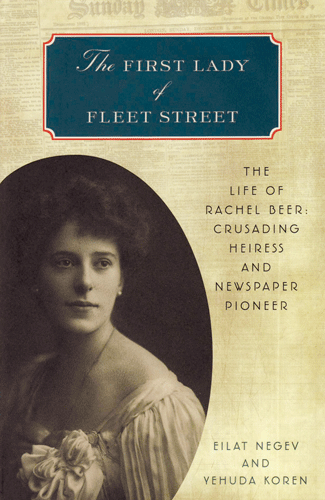Reviewed by NEAL GENDLER
Rachel Beer, daughter of the hugely wealthy Sassoon family, was born six or seven decades too soon.
A woman of ambition, strong will, great intelligence and even musical talent, Rachel transcended 19th century limitations and expectations of society women, whose interest in affecting the world usually went toward charity work. Back then, the authors say, it was believed “that too much intellectual activity would cause [women] nervous breakdowns.”
But funding hospitals and entertaining lavishly weren’t enough for Rachel, whose story is told well in The First Lady of Fleet Street, a resurrection of apparently forgotten history by Eilat Negev and Yehuda Koren. Their extensive research and smooth writing provide a vivid, sympathetic portrait of a woman of accomplishment, power and tragedy.
More than a century ago — before British women could vote or even sit in Parliament’s press gallery – Rachel edited two London newspapers, one she owned and one she ran for her tubercular husband. (Fleet Street was London’s “newspaper row.”)

The Sassoons were Baghdadi Jews who fled unrest to British-ruled India and built a huge fortune as traders — much of it in opium — and became philanthropists and part of Bombay high society.
Rachel’s father, son of the patriarch, opened the family’s London branch in 1858, when Rachel was born, moving his business into textiles and his Jewishly observant family into society. He died at 34, and a brother cut his branch out of the family business. But that still left plenty of money for Rachel’s family to live in high style on a county estate.
In her early 20s, Rachel, unmarried, bored at home and seeking “a purposeful life,” became a volunteer nurse in a tuberculosis hospital. “Rachel’s career of championing good causes had begun,” the authors say.
Then she met Frederick Beer. His father, Julius, had come alone to London from the swarming confines of the Frankfurt ghetto and made himself a fortune by investing in the new technologies of railroads and undersea telegraphy. Uninterested in religion, he married a Christian. Frederick and his sister were baptized.
Rachel, too, discarded her heritage, converting to Christianity the day before marrying Frederick — a Jew and a half-Jew becoming an Anglican couple, not that people would forget her origins. All her family but brother Alfred — also married to a Christian — shut her out, even from funerals.
Frederick and Rachel Beer lived grandly, generously patronizing the arts and counting among friends Prime Minister William Gladstone and his wife.
Frederick, who had lost his sister, parents, grandparents and an uncle by age 22, was “immensely rich.” Among his inheritance was The Observer, a small London daily Julius had bought to boost his status. Frederick gave the editor free rein, but Rachel increasingly injected herself into its operations. In 1894, she used her own money to buy the Sunday Times — becoming the first woman in the history of journalism to edit a national newspaper. She wrote editorials and a column of well-informed observations about the world.
Her success was all the more remarkable because she lacked most male editors’ university education, and not being a member of London’s (male) clubs deprived her of the gossip that uncovers much news. Advocating New Deal-style ideas, she was a strong supporter of women’s rights, workers, government efficiency and a fair trial for Alfred Dreyfus, exposing the true traitor.
As Frederick’s health worsened, Rachel edited both papers while also tending to him, running the household and still staging some charitable events.
Frederick, 43, died Dec. 30, 1901 — and so did Rachel’s spirits. Sunday Times columns grew rarer, then ceased. Deeply depressed, she withdrew from society and business life and neglected legal matters. In little more than two years, a court declared her of “unsound mind.” She wasn’t taken back into the family, but her brother Joseph became her prudent executor, maintaining her luxurious comfort until her death in 1927.
Had Rachel been born decades later, in the time of psychiatric medications, her success might have grown even larger and longer lasting.
Negev and Koren deserve praise for so competently rescuing her from obscurity.
***
Neal Gendler is a Minneapolis writer and editor.
(American Jewish World, 3.16.12)



















